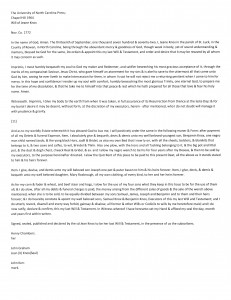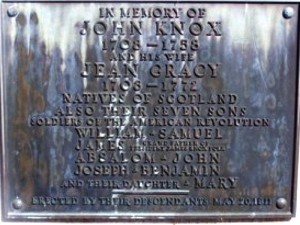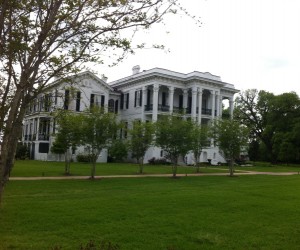plantation
 When I think of my husband, Bob’s 6th great grandmother, Jean Gracy Knox, I always think of Ellen O’Hara…Scarlett O’Hara’s mother, in Gone With The Wind. They lived in different eras, but in many ways, their lives were much the same. I can’t say, for certain, that Jean Knox lived on a plantation, but I do know that like many people in the 1700’s she owned slaves. With that in mind, I have to assume that she ran their home or plantation in much the way that Ellen O’Hara had. I don’t know much about her, of course, but her will seemed to be written by a woman who was used to being in charge. I know that she was a slave owner, because in her will, she mentions what is to be done with a young slave boy and a female slave that she owned. That and the extensive collection of clothing that she left her daughter, Mary indicates that she was a woman of wealth.
When I think of my husband, Bob’s 6th great grandmother, Jean Gracy Knox, I always think of Ellen O’Hara…Scarlett O’Hara’s mother, in Gone With The Wind. They lived in different eras, but in many ways, their lives were much the same. I can’t say, for certain, that Jean Knox lived on a plantation, but I do know that like many people in the 1700’s she owned slaves. With that in mind, I have to assume that she ran their home or plantation in much the way that Ellen O’Hara had. I don’t know much about her, of course, but her will seemed to be written by a woman who was used to being in charge. I know that she was a slave owner, because in her will, she mentions what is to be done with a young slave boy and a female slave that she owned. That and the extensive collection of clothing that she left her daughter, Mary indicates that she was a woman of wealth.
It’s possible that her “take charge” attitude came from the fact that her husband passed away fourteen years before she did, and six months before their youngest child was born. She had no choice but to take charge of things. She still had five children under the age of sixteen in her home. I’m certain that her older sons helped her out too, but from what I have gathered from her will, she was very much in control of her life, children, and property. I wish I had a picture of her, but in my mind, she probably looked much like Ellen O’Hara did, in Gone With The Wind. Beautiful, and very ladylike, and yet, she ran the household and even helped out the neighbors when necessary. Of course, I could be wrong on all that, but from what I have read of her will, she knew exactly what she wanted done after her passing. The will appears to have been written just days before her death. They assumed this from the fact that she made her mark on it, and not her signature, even though she could read and write. In looking at the will, of which I only have a word for word copy of the wording as it was written…including all the spelling errors, I at first thought that maybe she couldn’t read and write, but later discovered that it was not written by her. She just dictated it to someone else to write up and then signed it in front of witnesses, much like we would do today in front of a attorney. This could also have been an indication of wealth, and the power that one assumes to have because of it.

I also know, that Jean was a woman of strong faith. She was a Presbyterian, and most likely left her native Ireland because of disputes between the Presbyterians, also known as Covenanters, and the Church of England. The Knox family is among those who were persecuted because of their religion, and that some had to leave their homes in the middle of the night to escape death. They came to America seeking religious freedom. That in itself would take a person of strong character, and may have been part of what made Jean Gracy Knox into a woman who was well able to handle the things that came her way. Jean’s life was not long, by today’s standards anyway, but in that day and age, she did live a long time, and it is my opinion that she also did a lot of living during her lifetime. I’m sure that I will never really know the whole story of her life, but I will always believe that she was quite a lady.
 Bob and I are on a trip to Florida, Louisiana, Alabama, and Mississippi. It is a trip I have looked forward to for some time. As I have read through letters from the past and searched for past records for my family, it seems fitting that I should travel to an area of our country in which resides so much of our nation’s past. I don’t know if any of my ancestors were plantation owners or not, but I do know that some of them came from the south, so I suppose there is a possibility.
Bob and I are on a trip to Florida, Louisiana, Alabama, and Mississippi. It is a trip I have looked forward to for some time. As I have read through letters from the past and searched for past records for my family, it seems fitting that I should travel to an area of our country in which resides so much of our nation’s past. I don’t know if any of my ancestors were plantation owners or not, but I do know that some of them came from the south, so I suppose there is a possibility.
Going through Nottoway Plantation, gave us a peek into the lives of the very wealthiest plantation owners. These were people who could not “afford” to marry for love. Every child in the family knew what was expected of them. You married to better your standing and value…even if that meant marrying your cousin, as did happen in some cases, but was not totally common. Does this remind you of “Gone With The Wind”? It did us, but that is how the wealthy lived in those days, and maybe even more than we know in today’s world.
The Randolf family completed Nottoway Plantation in 1859 after 2 years of construction. It was situated right on the Mississippi River, and that was how the family traveled…by river boat, directly into New Orleans. They new no shortage of funds, and lived extravagantly…at least until the Civil War broke out in 1861. One of their sons was killed in the war, one became ill and was sent home, and one was captured. Still, the family proved what they were made of. The father, John went to Texas to grow cotton in order to make money, and the wife and some of the daughters stayed in the family home…even when the Yankee troops showed up. A wise woman, Emily offered to let the troops camp on her property and use what they needed. They took most of the vegetables and livestock, but left the home and the women alone…mostly because one of the soldiers knew one of the Randolf boys.
The home was made of the finest Virginia Cypress wood, which resisted rotting and termites, so the home has endured through the years. The shutters made of the same wood, are simply closed when hurricanes came, and the glass is even protected. The home is beautiful, and the family held many balls there as their children came of age for marrying, because they had to make sure that their children married from the right families.

While this family was wealthy and extravagant, they were also among the few families in the South who were good to their slaves. After the harvest and at Christmas time, John Randolf roasted a pig, and the family ate with the slaves. During that party, John handed out money to his slaves as a reward for jobs well done. Because of that, when the Civil War was over, and John offered contracts to his slaves, so they could now work for a wage, most of them stayed on with him. From the pay they had received through the years, they trusted him to keep his word and pay them after the war as well.
As I said, I don’t know if my family were plantation owners or not, but I like to think that if they were, they would be like John and Emily Randolf, who treated their slaves with kindness. I don’t like the idea of slavery, but I suppose that the people of that time didn’t know any different. It was a different culture, and as far as slaves are concerned, one that I think should not have happened, but unfortunately it is a part if our nation’s past.

